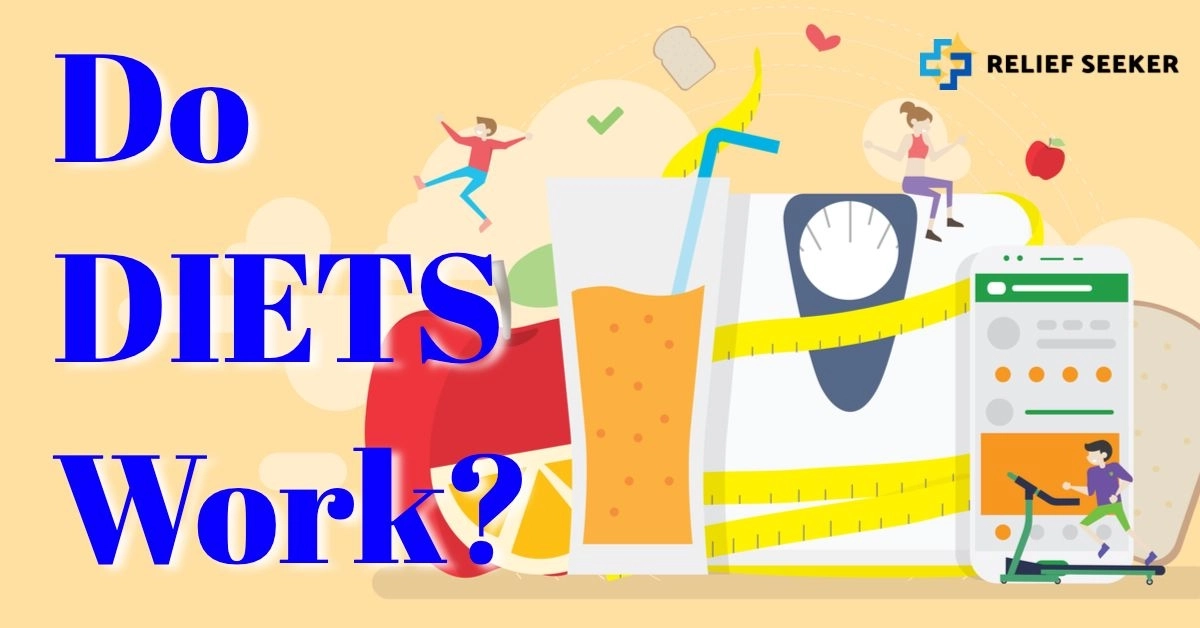If you’re like most Americans, you’ve probably been on a diet or two in your lifetime. 45 million Americans diet each year, and the diet industry rakes in a whopping $33 billion annually.
Yet, how many of these diets work? Do dieters keep the bodyweight off? And how often does weight loss take precedence over healthcare initiatives such as healthy eating?
Discover why most weight-loss plans fail, how to escape the diet fad rat race, and what apps and tools are actually worth their weight.
Do Diets Work?
In short, no. Most weight-loss plans fail simply because they aren’t built for long-term success. They may work for a few days, weeks, or months — but don’t keep weight off long term. While it’s important to note that weight fluctuations throughout one’s lifetime are completely normal, dramatic weight changes are not.
Is Dieting Healthy?
Most diets simply aren’t healthy long-term. That’s because they focus on weight-loss and short-term results.
If you’re trying to lose weight, your end-goal may simply be to drop a certain number of pounds. Yet, if your only goal is weight loss, you may forget to eat foods that nourish your body in lieu of calorie deprivation.
Short-term dieting usually leads to calorie restriction. Since many people that lose weight fast often put the weight back on just as fast, this behavior may result in yo-yo dieting, which can be harmful to your health. In fact, yo-yo dieting can lead to the following chronic conditions:
Cardiovascular diseases
Fatty liver disease
High blood pressure
High cholesterol
How to Spot a Fad Diet
If you’re trying to lose weight, you may want to steer clear of fad diets. These weight-loss plans offer short-term results, extreme restriction, and low nutrients. If you’re worried that you’re heading into a weight-loss wasteland, keep your eyes open for these red flags, and ask yourself:
Is the diet too good to be true?
Does the diet recommend extreme restriction?
Do you cut out an entire nutritional food group?
Is the diet a set length of time?
Fad diets are usually too good to be true
Fact. If a diet seems too good to be true (promises fast weight-loss or easy weight-loss, it’s probably a fad diet.
These diets often focus on calorie restriction but don’t include enough nutrients to keep your energy levels high throughout the day.
Fad diets cut out entire food groups
Fact. Many fad diets cut out entire food groups, such as the ‘white’ diet that restricts any foods white in color, the ‘cabbage soup diet’ that only allows you to eat cabbage soup for most of the diet, and the ‘lemonade cleanse’ that only allows you to eat one meal a day while substituting every other meal with a spicy/sweet beverage.
Many fad diets will also recommend replacing meals with juices, shakes, or soups. While this may be healthy every once in a while, it isn’t usually sustainable long-term.
Fad diets usually recommend extreme restriction
Fact. Since fad diets focus on weight-loss and not nutrition, they usually include some type of extreme restriction. This often includes caloric restriction and/or restriction of certain food groups.
You can spot these diets because they recommend eating fewer than 1,200-to-1,500 calories per day (depending on your current weight), restrict other nutrients and macronutrients such as carbohydrates and/or fat.
Also, be wary of the words detox, fast, and cleanse.
(Some health plans, such as low-carb diets, may be healthy long-term; talk to your doctor before starting any type of restriction plan).
One food group that’s usually OK to restrict is stimulants. Restricting your sugar, caffeine, nicotine, and alcohol intake are more often than not completely healthy. These stimulants can mess with your hormones, your hunger signals, and your weight.
The important thing is to know your own body when it comes to restricting these substances. If you wake up each morning only for that one cup of coffee, treat yourself. If you look forward to one chocolate chip cookie every week, go for it. Just don’t go overboard.
A note about fasting: some religions, cultures, and diets recommend fasting for a set period of time. Some dieticians and doctors do agree that fasting for a minimal amount of time (under 12 hours) once or twice a year is healthy. Talk to your doctor before fasting (especially if you’ve never fasted before or have a history of eating disorders).
Reasons Most Weight-Loss Plans Fail
Most weight-loss plans:
Are not built for long-term success
Focus on weight-loss instead of nutrition
Rely too much on sublimation
Don’t allow for deviation/are too restrictive
Encourage a disconnect between mind and body
Don’t get to the root of the eating disorder
Short-Term Success
Many diets focus on short-term successes to attract lots of followers. They often do work for a short amount of time but don’t provide long-term weight loss or health benefits.
Weight-Loss Vs Nutrition
Most diets are focused on weight loss and not healthy eating habits. Many diets claim they are dietitian-approved, and some even promote and sponsor processed foods that contain ‘high quantities of added nutrients.’
Yet if you want to get more nutrients, you really only need to turn to the cheapest and healthiest foods available — fruits and veggies.
Encourage Sublimation
Many diets also encourage sublimation, which in itself isn’t necessarily a bad thing. Yet, sublimation can lead to even more unhealthy habits.
It’s essentially trading an unhealthy habit (like binge eating) with a healthier one (like exercising). Every time you get a craving for ice cream, simply run a mile instead.
While this isn’t a bad way to lower cravings, it doesn’t get to the bottom of your emotional craving (avoid boredom, want more love, need approval). While you’ll probably avoid the trigger’s response, you won’t truly ever be free of the emotional trigger itself.
Calorie Restriction
Most diets restrict calories, which can lead to restricting nutrients. These diets focus on the outer goals (such as weight loss) but ignore the dieter's emotional and nutritional needs.
If you’re only focusing on restricting calories, fats, or carbs, you’re probably not paying attention to the number of nutrients your body is taking in.
Mind/Body Disconnect
Many diets recommend ignoring your hunger, cravings, and satiation. They tell you to do things like chew gum or drink coffee to suppress hunger pains or exercise instead of eating.
When you do this, you repress your feelings and bodily urges instead of listening to them. You may suffer from long-term health issues as a result, and it may take months or even years to start understanding when you’re truly hungry or full again.
Tips for Long-Term Weight-Loss Success
If you’re looking for long-term weight-loss success, there are some amazing resources available to help you get there.
Take It Slow
Any diet plan that promises short-term weight-loss is probably a gimmick or a fad. When it comes to weight-loss success, slow and steady wins the race.
Even people that undergo weight-loss surgery often wait for up to a year or two to reach their weight-loss goals.
Take time to build healthy habits, discover what works for you, and ignore the rest. You know your body better than anyone, so don’t let weight-loss gurus or influencers tell you otherwise.
Know Thy Body
If you abhor meal planning, brainstorming meal ideas, or thinking too much about food, don’t! It’s completely OK to eat the same thing for breakfast every morning. What you don’t want to do is create restrictive rules that state you can’t eat oatmeal one day and an omelet the next.
Beware of ultra-restrictive rules, but don’t be afraid to do what’s easiest, too.
Focus on What You Can Eat
Not on what you can’t. Eating healthy, nutritious foods doesn’t mean you can’t enjoy each meal. There are plenty of whole fruits, veggies, proteins, and snacks available.
Instead of feeling bummed that eating a huge piece of chocolate cake would derail your weight-loss goals, try finding new sweets that are also nutrient-rich (maybe you’ll love yogurt with honey, cherries, and pistachios — but you never knew it because your go-to sweet was always cake?).
Focus on whole foods, like fruits and veggies. The fewer ingredients involved, the better. Add a little protein, some complex carbs, and a little fat to the mix (depending on your doctor’s recommendations).
If you need some inspiration, take a cooking class. It’s a great way to learn a few new recipes and make starting a new nutrition plan an event!
Pay Attention to Portions
Binge eating sweet potatoes, carrot sticks, and raspberries is still binge eating. While you won’t end up eating as many calories as you would if you binged potato chips and cake, you’ll still be using food as a tool to avoid a feeling or emotion.
Listen to your body as you eat. If you feel full, stop. If you’re still hungry, keep eating!
Many cultures practice leaving a little food on their plate at the end of the meal. Some do it as a ‘sacrifice’ while others simply do it for health reasons. It doesn’t need to be a huge portion of your meal — just a little bit of food. And if you’re still hungry? Definitely finish the whole serving!
Use Fad Diet Tricks
Without doing the fad diet itself.
Fad diets are popular for a reason. They use tricks and tips to make dieting easier and more fun. The problem is they take it to the extreme.
If you’re exhausted and don’t want to make breakfast, start your day with a green juice or smoothie. If you don’t want to worry about meal planning, make a huge pot of soup (cabbage or other), and eat it for lunch all week long.
Just don’t fall into the fad diet trap. It would be best if you never used diuretics or stimulants other means to move food through your body faster or repress your appetite.
Talk to a Therapist
Food is an extremely complicated thing for some of us. Not everyone looks at food as fuel. It often carries emotional weight. We eat to numb our pain, and we often eat to feel something, too.
Emotional eating, extreme dieting, and eating disorders are all mental health concerns that may take a little more time to unpack. If you use food as a tool to repress emotions, you may want to talk to a therapist that specializes in eating disorders.
Online therapy platforms like Talkspace can match you with a therapist that specializes in emotional eating, binge eating, and other eating issues. Schedule live video sessions or send text, video, or audio messages whenever you feel a craving.
Nutrition Apps
Nutrition health apps are designed to offer nutritional support and weight management advice to people that want to meet their food goals.
Some apps are designed to help you track nutritional and exercise data, while others provide platforms to help you work through eating habits and challenges. Nearly all nutritional apps provide information and articles to help you understand common nutritional and weight-loss challenges and issues.
Apps like Weight Watchers help you track food through a points system. Some plans offer nutritionist support, and nearly all plans provide community support through chat rooms and message boards.
Apps like Lose It! and Weight Loss: Workout at Home offer similar calorie tracking features as well as nutritional advice and workout videos.
Support Groups
If you need more emotional support to meet your nutritional goals, you may want to join a support group. These groups meet to discuss challenges and offer support to others dealing with similar issues.
Online support groups provide a virtual safe space to discuss issues; support groups like Wisdo will match you with someone that has already ‘been through it’ (like a sponsor), so people that are suffering through an issue can get hands-on advice from people that have already found some success in their nutritional or weight-loss goals.
If you find that most diets don’t work for you, you’re not alone. Most weight-loss plans fail simply because they’re not created for long-term success. Luckily, there are plenty of apps, professional therapists, and support groups designed to help you understand your own unique nutritional needs and weight-loss goals.


